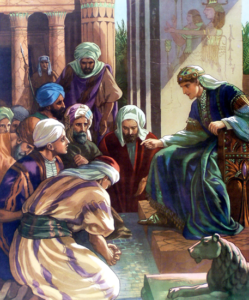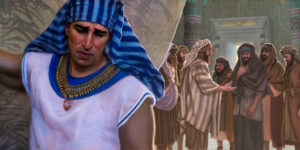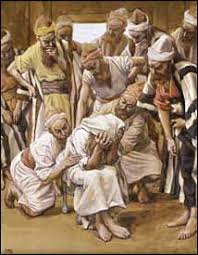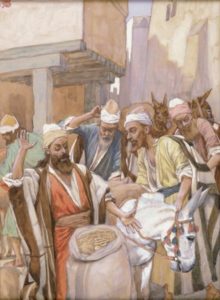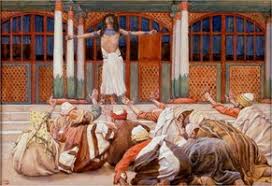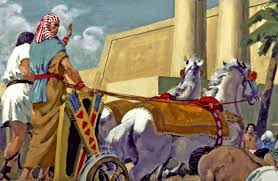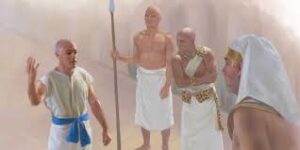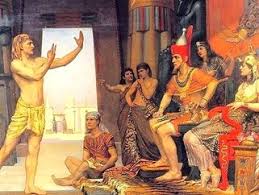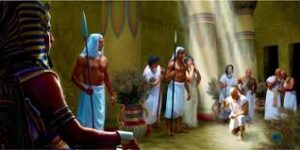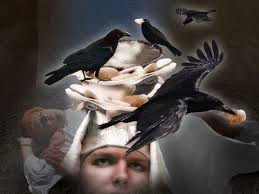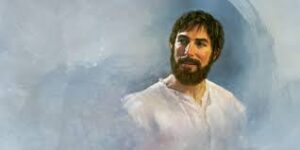Kf – The Cup was Found in Benjamin’s Sack, at this They Tore Their Clothes 44: 1-17
The Cup was Found in Benjamin’s Sack,
at this They Tore Their Clothes
44: 1-17
The cup was found in Benjamin’s sack, at this they tore their clothes DIG: Why does Joseph place the silver bowl in Benjamin’s sack? Why the exciting delay in sending the steward after them? How do the brothers respond when the planted bowl is found in Benjamin’s sack? How do these feelings compare with their feelings at the end of Chapter 43? With what Yosef felt at the end of Chapter 37? What changes have taken place in their lives?
REFLECT: Where in your family or at work have you seen someone whose “walk matched his or her talk?” Do you see this in your own life? Where is it tougher, at home, at work, or socially, for you to achieve this?
Clearly elated after their dinner with the prime minister of Egypt, the brothers pack up and head home. They have food to stave off the famine in Canaan, and they are returning with Simeon and their youngest brother Benjamin.673 How pleased their father will be! But this was all part of Joseph’s plan. Even though they had shown real sorrow for their sin against him, had confessed it as sin, and shown no resentment against Benjamin, Joseph was still not sure what their attitude might be if they had to choose between their own personal welfare and that of Benjamin and their father.674 In view of that, he needed to satisfy his mind in this regard before he made himself known to them. The test he used would give him absolute proof that his brothers would not repeat the same sin that he had experienced at their hands so many years before.675
Now as part of the test, Joseph gave these instructions to the steward of his house: Fill the men’s sacks with as much food as they can carry. The sacks on their donkeys could only carry so much, and they needed to feed hundreds of people. Then he added: put each man’s silver in the mouth of his sack. Then put my cup, the silver one, in the mouth of the youngest one’s sack, along with the silver for his grain. (44:1-2a). In essence, he framed Benjamin. The gabia, here rendered cup, was more properly a bowl, and was distinguished from the kosoth, or smaller cups, into which the liquid was poured from the gabia. The distinction is made in Jeremiah 30:5, where the two words are used. Then I set bowls (gabia) full of wine and some cups (kosoth) before the men of the Recabite family and said to them, “Drink some wine.”676
It would have been easy for one of the brothers to slip the silver bowl into his sack. They had just finished dining with Yosef; perhaps the bowl was temptingly placed on the eating table. At least it had to be displayed in a place where the guests had access to it or could observe it so that they could later be charged with stealing it. It was unlikely that they could have had the chance to burglarize Joseph’s house while they were his guests. But they could have easily hid it under one of their coats, then slipped it unnoticed into one of their sacks.677 The test was to see if the brothers would abandon Benjamin as they once had abandoned Joseph. And the steward did as Joseph said. This bowl was a symbol of his authority, and to steal it would be a serious crime. As morning dawned, the men were sent on their way with their donkeys (44:2-3). All seemed to be going well.
They had not gone far from the city limits when Yosef said to his trusted friend: Go after those men at once, and when you catch up with them say, “Why have you repaid good for evil?” Then after inspecting the sack of the youngest, say, “Isn’t this the silver bowl my master drinks from and also uses for divination” (44:4-5a)? The Hebrew literally reads: Nacheish Yeanacheish, which translates from divining he divines. This comes from the same root as the word for serpent because the occult is connected with Satan. This was part of the ploy because Joseph wanted to make the crime seem worse, but in actuality, he did not use any kind of divination.
Of course there were silver bowls used for divination. This is how they were used. Clean water would be poured into such a bowl, then particles of gold, silver or precious stones would be dropped into the clean water. Then oil would be added to the clean water. Then depending on how light would shine between the oil and the particles, a prediction would be made. It was viewed as a sacred vessel. Then, at the appropriate moment the steward pretended to scowl: This is a wicked thing you have done (44:5b)!
When the steward and his many soldiers caught up with them, he repeated these words to them. But they said to him, “Why does my lord say such things?” Far be it from your servants to do anything like that! We even brought back to you from the land of Canaan the silver we found inside the mouths of our sacks. So why would we steal silver or gold from your master’s house? Their reasoning was this: How could we be guilty of stealing a bowl, when we were honest and returned the silver we found in our sacks after the first trip? And they were so sure that none of them had stolen the silver bowl that they made an offer to the steward. They said: If any of your servants is found to have it, he will die; and the rest of us will become my lord’s slaves (44:6-9). Their offer was sincere, but did not accomplish Joseph’s intent. The counter proposal of the servant modifies the penalty even though he seemingly agrees with them.
The servant said: Very well then, let it be as you say. Whoever is found to have it will not be executed, but will become my slave; the rest of you will be free from blame. Now their choice would be between self-preservation and Benjamin’s welfare. Will family unity and loyalty prevail? Had the brothers changed since the time they had sold Joseph? All the conditions were set for another betrayal. Each of them quickly lowered his sack to the ground and opened it (44:10-11).
Then the steward proceeded to search the sacks of the brothers. The verb search is the same one used in 31:35 to describe Laban’s search of Jacob’s tents for his household gods. There is tension that is built up in both accounts. Laban starts in Jacob’s tent, moves to Leah’s tent, then to the tents of Bilhah and Zilpah, and lastly searches Rachel’s tent. The tension builds because the narrator and the reader already know the household gods are in Rachel’s tent. Here, Joseph’s steward, to cause tension to build, began with the oldest ending with the youngest because he already knew Benjamin had the silver bowl (44:12a).
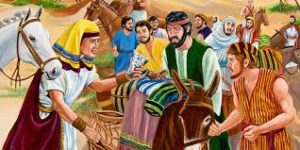
As sack after sack was opened without finding the bowl they must have felt more and more vindicated – even angry. They must have thought, “How dare he accuse us!” But then, at the very last, the silver bowl was found in Benjamin’s sack. The sudden threat to Benjamin was like a sword thrust through their hearts, and was an indication that they were indeed changed men. At this, they tore their clothes in mourning, a response that they had earlier caused their father to make over the loss of Yosef. Now they loved their father too much to face him with the news that Benjamin, like Joseph, was gone.678 So in shock and disbelief, they all loaded their donkeys again and returned to the city (44:12b-13).
Joseph, who was expecting them to come back, was still in the house when Judah and his brothers came in. He no doubt was overjoyed when he saw all of them returning instead of Benjamin alone. However, he still needed to hear from their own lips their thoughts and feelings as they threw themselves to the ground before him once again (44:14).679 At this point, Judah was the leader of the brothers. He had initiated the sale of Yosef, but now he would sacrifice himself for the sake of Benjamin.
Joseph said to them: What is this you have done? Don’t you know that a man like me can find things out by divination (44:15)? By this point the brothers were certainly convinced of that! His knowledge of them had been uncanny and astonishing. But this was part of the test. Of course, Joseph did not practice divination; he just wanted his brothers to understand that the silver bowl was used as a sacred vessel.
70. Joseph and Jesus will not reveal themselves until the children of Isra’el confess their sin. Judah replied: What can we say to my lord? How can we prove our innocence? God had uncovered your servant’s guilt (44:16a). It was after this that Joseph revealed himself (45:3), and so it will be with Jesus. Through the mouth of the prophet He says: Then I will go back to My place until they admit their guilt and they will seek My face; in their misery they will earnestly seek Me (Hosea 5:15). So as a condition for the Second Coming, the children of Isra’el will cry out: All of us have become like one who is unclean, and all our righteous acts are like filthy rags (Isaiah 64:6). At that time ADONAI will reveal Himself to the believing remnant of Jews at the end of the Great Tribulation (see my commentary on Revelation Ev – The Basis for the Second Coming of Jesus Christ). There are eighty ways that the life of Joseph would prepare the Jews for the coming of Jesus Christ (see the commentary on Genesis Iw – The Written Account of the Generations of Jacobs).
Judah’s statement, God had uncovered your servant’s guilt, was one of the things that Yosef was looking for. He obviously knew Benjamin didn’t steal the silver bowl, but Judah saw the whole thing as God’s retribution for the way he and his brothers had dealt with Joseph. Judah saw this as Ha’Shem’s way of dealing with their past sin against their brother. They withheld mercy from him (42:21), and now the LORD would withhold mercy from them. They deserved what was happening to them even if they were not guilty of that particular crime.680 We are now my lord’s slaves – we ourselves and the one who was found to have the silver bowl (44:16b). If Benjamin was guilty, so were they all.
Judah is discerning enough to know that one’s sins will normally find one out, and those sins will serve to punish the sinner. God often works that way (see my commentary on Esther, to see link click Bf – So They Impaled Haman on the Pole He Had Set Up for Mordecai). Even at the cross there is a sense of retributive irony. There the Adversary and his followers attempted to destroy the promised One by hanging Him on a cross. But it was the very death of the Messiah that brought about the eternal defeat of Satan and his demons. And, of course, they did what God’s power and will had decided beforehand should happen (Acts 4:28). The tempter and all his fallen angels meant the cross for evil, but God used it for good.681
But Yosef rejected Judah’s offer when he said: Far be it from me to do such a thing! Only the man who was found to have the silver cup will become my slave. And seeing if they would really abandon their brother, Joseph said: The rest of you, go back to your father in peace (44:17). This was the final test of the brothers, and particularly Judah. Would they stand by Benjamin or let him become a slave? Had Judah really changed, or would history repeat itself?
Haftarah miKetz: M’lakhim Alef (First Kings) 3:15-4:1
(see my commentary on Deuteronomy, to see link click Af – Parashah)
The Torah portion is preceded by Joseph’s dreams that his brothers would bow down to him. The Haftarah is preceded by a dream in which Solomon asks ADONAI for wisdom to rule. The test came immediately. At a feast, two women approach the young king, both claiming to be the mother of a newborn baby. Each insists that the other’s baby died during the night. Solomon rules that the baby should be divided and half given to each woman. The true mother was filled with compassion for her son and said to the king, “Please, my lord, give her the baby! Don’t kill him” (First Kings 26-26a). Her display of compassion contrasted sharply with cold response of the other, who was satisfied to see the baby cut in two. Solomon ruled that the baby should be given to the woman who showed compassion. The people were in awe of their king, because they saw the wisdom of God at work in him (First Kings 3:28).
B’rit Chadashah suggested reading for Parashah miKetz:
Matthew 27:45-50; Acts 7:9-16 (specifically verses 11 and 12)
What could be worse than separation from God the Father? At Gethsemane, Yeshua prayed that His cup of suffering be removed, but surrendered His will to the Father (Matthew 26:39). It was customary before Passover for the imperial magistrate of Rome to acquit or pardon a prisoner charged with a capital offense. Pilate’s wife dreamed that Yeshua was not deserving of crucifixion (Matthew 27:19), and she warned her husband. But the crowd demanded the release of Barabbas, literally, bar-Abbas, or son of the father, a popular zealot (John 18:40; Luke 23:14-19; Acts 3:14). When Yeshua was crucified, God made Him who had no sin to be sin for us (Second Corinthians 5:21a), He was cut off from God the Father and darkness covered the entire world (see the commentary on The Life of Christ Lv – Jesus’ Second Three Hours on the Cross: The Wrath of God).



